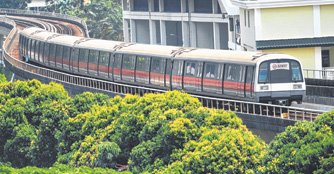SMRT CEO insists that firm is doing "everything possible" to avoid delays
17 Feb 2014|5,315 views
The Chief Executive of SMRT, Desmond Kuek, delivered his strongest comments pertaining to the increasing train delays and disruptions, and has affirmed the rail operator will continue to do "everything possible" to improve reliability of its rail network. The comments were delivered just weeks after the rail operator faced three disruptions last month, which lead to Transport Minister, Lui Tuck Yew, to express his disappointment.

For example, SMRT has replaced the power supply units on its first generation trains and upgradedthe software on third generation trains to reduce propulsion faults - a primary reason why nearly a third of trains were withdrawn from service in 2011 and 2012. Signalling issue was another significant cause of withdrawals in the past three years, and the problem is being addressed.
SMRT Trains Executive Vice President, Lee Ling Wee, explained the rail operator is replacing all ageing signalling equipment on the trains first, although another round of replacement exercise will take place by 2018 when a new signalling system is in place.
Along with investing in better hardware, including new sensors to detect faults, such as sags in the power-supplying third rail, the rail operator will also intensify its technical workforce by about 100 to 200 engineers in the forthcoming years, to complement the more than 100 already available. More technicians will also be brought in.
While commuters may be affected with the ongoing works on the ageing lines, SMRT is planning to close the two lines earlier on some evenings from April, with an option on weekends as well, so its engineers have more time to work.
Mr. Kuek cited the changes are in line with SMRT's "zero-defect" attitude to its operations. Mr. Kuek told the local paper that every delay or disruption is being investigated to address the root cause of every incident. He believes future incidents can be prevented with valuable lessons learnt.
Still, the implemented measures have caused the number of delays to reduce overall. In 2011, 302 of such reported incidents caused delays of above five minutes on the two lines, while in 2012 it went down to 277. The number of cases further dropped to 229 last year. The number of trains withdrawn due to technical errors also decreased by 32 percent.
The Chief Executive of SMRT, Desmond Kuek, delivered his strongest comments pertaining to the increasing train delays and disruptions, and has affirmed the rail operator will continue to do "everything possible" to improve reliability of its rail network. The comments were delivered just weeks after the rail operator faced three disruptions last month, which lead to Transport Minister, Lui Tuck Yew, to express his disappointment.
Mr. Kuek told The Straits Times his firm has invested "significant resources" to improve reliability on the older North-South and East-West lines along with an overhaul of all major systems on older trains.
For example, SMRT has replaced the power supply units on its first generation trains and upgradedthe software on third generation trains to reduce propulsion faults - a primary reason why nearly a third of trains were withdrawn from service in 2011 and 2012. Signalling issue was another significant cause of withdrawals in the past three years, and the problem is being addressed.
SMRT Trains Executive Vice President, Lee Ling Wee, explained the rail operator is replacing all ageing signalling equipment on the trains first, although another round of replacement exercise will take place by 2018 when a new signalling system is in place.
Along with investing in better hardware, including new sensors to detect faults, such as sags in the power-supplying third rail, the rail operator will also intensify its technical workforce by about 100 to 200 engineers in the forthcoming years, to complement the more than 100 already available. More technicians will also be brought in.
While commuters may be affected with the ongoing works on the ageing lines, SMRT is planning to close the two lines earlier on some evenings from April, with an option on weekends as well, so its engineers have more time to work.
Mr. Kuek cited the changes are in line with SMRT's "zero-defect" attitude to its operations. Mr. Kuek told the local paper that every delay or disruption is being investigated to address the root cause of every incident. He believes future incidents can be prevented with valuable lessons learnt.
Still, the implemented measures have caused the number of delays to reduce overall. In 2011, 302 of such reported incidents caused delays of above five minutes on the two lines, while in 2012 it went down to 277. The number of cases further dropped to 229 last year. The number of trains withdrawn due to technical errors also decreased by 32 percent.
Latest COE Prices
February 2026 | 2nd BIDDING
NEXT TENDER: 04 Mar 2026
CAT A$106,501
CAT B$105,001
CAT C$74,999
CAT E$112,890
View Full Results Thank You For Your Subscription.


















